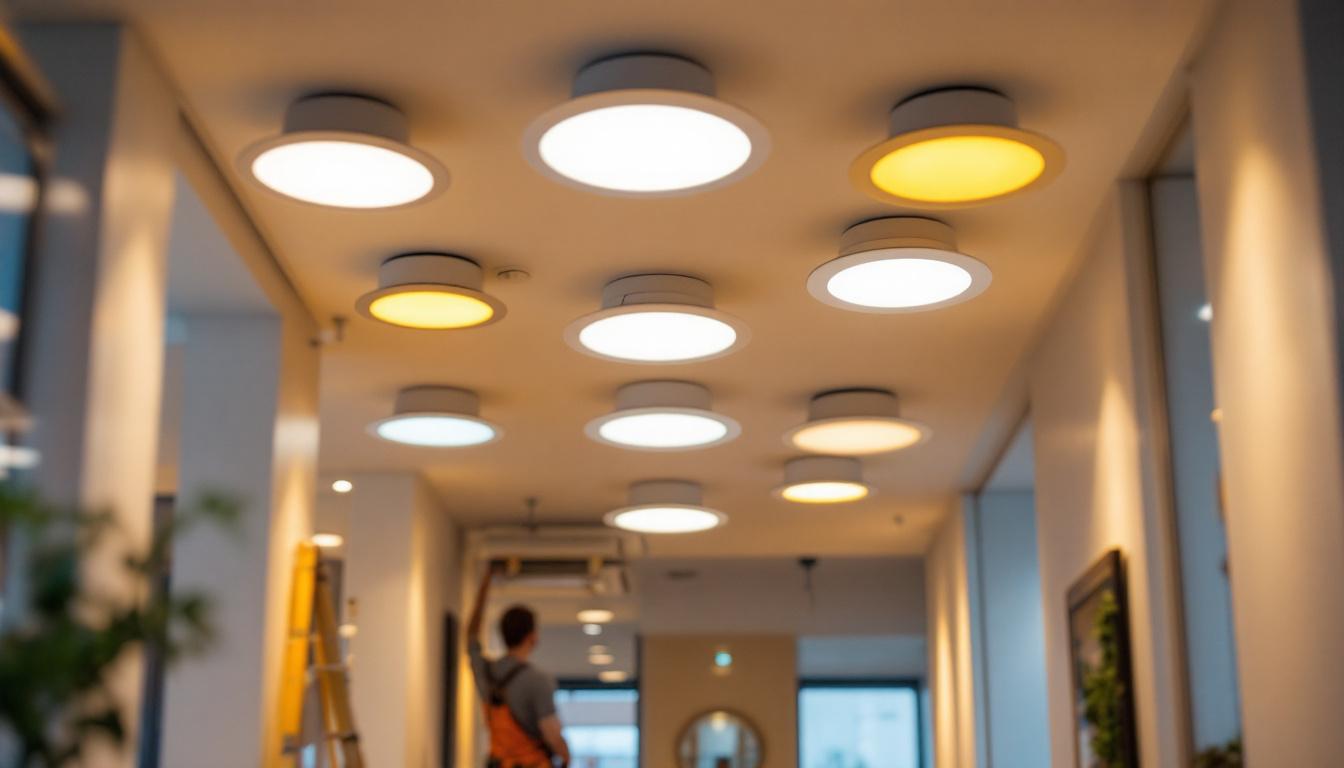
Lighting contractors play a crucial role in the design and installation of lighting systems, and the choice of light bulbs is an essential aspect of this process. Among the various lighting options available, light tube bulbs have gained significant popularity due to their efficiency and versatility. This article aims to provide valuable insights and advice for lighting contractors regarding light tube bulbs, covering their benefits, installation tips, and considerations for various applications.
Light tube bulbs, often referred to as LED tube lights or linear LED lights, are designed to replace traditional fluorescent tube lights. These bulbs are not only energy-efficient but also offer a longer lifespan, making them an attractive option for both residential and commercial lighting applications.
There are several types of light tube bulbs available on the market, each with its unique characteristics. The most common types include:
Choosing light tube bulbs for projects comes with numerous advantages. First and foremost, energy efficiency is a significant benefit. LED technology consumes significantly less power compared to traditional fluorescent bulbs, leading to lower energy bills for clients.
Additionally, light tube bulbs have a longer lifespan, often lasting up to 50,000 hours or more. This longevity reduces the frequency of replacements, which is particularly beneficial in commercial settings where maintenance can be costly and disruptive.
Moreover, light tube bulbs offer better light quality, with options for different color temperatures that can enhance the ambiance of a space. This flexibility allows contractors to tailor lighting solutions to meet the specific needs of their clients.
Another noteworthy advantage of light tube bulbs is their environmental impact. Unlike fluorescent lights, which contain hazardous materials like mercury, LED tube lights are free from such toxic substances, making them a safer choice for both the environment and human health. This eco-friendly aspect is increasingly important to consumers and businesses alike, as sustainability becomes a priority in purchasing decisions.
Furthermore, the versatility of light tube bulbs extends beyond just their installation and energy efficiency. They are available in various sizes and styles, allowing for creative lighting designs that can transform spaces. Whether used in a home office, retail store, or industrial warehouse, these bulbs can be utilized in a range of applications, providing both functional and aesthetic benefits. Their ability to produce instant brightness without flickering also enhances the user experience, making them a preferred choice for many lighting projects.
Proper installation is crucial for maximizing the performance and longevity of light tube bulbs. Here are some essential tips that lighting contractors should consider:
Before selecting light tube bulbs, it’s important to assess the existing fixtures. Understanding whether the fixtures are compatible with direct replacement, ballast bypass, or hybrid bulbs will guide the selection process. Contractors should also check the wattage and size of the existing tubes to ensure a proper fit.
In some cases, modifications may be necessary, especially when opting for ballast bypass tubes. This may involve removing the ballast and rewiring the fixture, which requires a solid understanding of electrical systems. It is also beneficial to inspect the condition of the fixtures themselves for any signs of wear or damage. Fixtures that are corroded or have loose connections may not only hinder the performance of the new bulbs but could also pose safety risks. Addressing these issues before installation can save time and ensure a smoother transition to the new lighting system.
When installing ballast bypass LED tubes, ensuring proper wiring is critical. Incorrect wiring can lead to flickering lights or complete failure of the bulbs. Contractors should follow the manufacturer’s instructions closely and, if unsure, consult with a licensed electrician.
Additionally, it is advisable to use wiring that can handle the power requirements of the new bulbs. Using the correct gauge and type of wire will help prevent overheating and potential hazards. It’s also wise to consider the overall electrical load on the circuit. If multiple fixtures are being upgraded simultaneously, contractors should assess the total wattage to ensure it does not exceed the circuit’s capacity. This proactive approach can prevent circuit overloads and enhance the reliability of the lighting system.
After installation, testing the light tube bulbs is essential to confirm they are functioning correctly. This includes checking for flickering, color consistency, and brightness levels. Conducting these tests ensures that the installation meets quality standards and client expectations.
Furthermore, contractors should educate clients about the features of their new lighting system, including how to troubleshoot common issues. This knowledge empowers clients and can enhance their satisfaction with the installation. Providing a brief tutorial on how to adjust settings or replace bulbs in the future can also foster a sense of confidence in the new system. Additionally, contractors might consider offering maintenance tips, such as regular cleaning of the fixtures and periodic checks on the wiring, to help clients maintain optimal performance over time. This kind of ongoing support can lead to long-term relationships and repeat business, as satisfied clients are more likely to recommend services to others.
Light tube bulbs can be utilized in a wide range of applications, from residential settings to large commercial spaces. Each application may have unique requirements that contractors should consider.
In residential settings, light tube bulbs can be used in kitchens, living rooms, and home offices. The ability to choose from various color temperatures allows homeowners to create the desired ambiance. For instance, warmer tones may be preferred in living areas, while cooler tones can enhance productivity in home offices.
Contractors should also consider dimmable options for residential clients who desire flexibility in their lighting. Dimmable LED tube lights can create a cozy atmosphere for family gatherings or provide bright light for tasks such as cooking or reading.
In commercial environments, such as offices, retail spaces, and warehouses, light tube bulbs can significantly impact energy efficiency and employee productivity. Bright, evenly distributed lighting can enhance visibility and create a more inviting atmosphere for customers and staff alike.
When working on commercial projects, contractors should also consider the lighting layout. Proper placement of light tube bulbs can reduce shadows and improve overall illumination. Using lighting design software can help visualize the layout and ensure optimal results.
Some applications may require specialized light tube bulbs, such as those designed for specific industries or environments. For example, food processing facilities may need bulbs that are resistant to moisture and easy to clean, while healthcare facilities may require lighting that meets specific regulatory standards.
Contractors should stay informed about the latest advancements in lighting technology and regulations to provide clients with the best solutions tailored to their unique needs.
As energy efficiency becomes increasingly important, contractors must understand the sustainability benefits of light tube bulbs. The shift towards LED technology aligns with global efforts to reduce carbon footprints and promote environmentally friendly practices.
When selecting light tube bulbs, it’s essential to consider their energy ratings. Look for bulbs that are ENERGY STAR certified, as these products meet strict efficiency guidelines set by the U.S. Environmental Protection Agency. This certification not only ensures high performance but also qualifies clients for potential rebates and incentives.
By choosing energy-efficient products, contractors can help clients save on energy costs while contributing to a more sustainable future.
Lighting contractors can also promote sustainable practices by educating clients on the benefits of recycling old bulbs and fixtures. Many communities offer recycling programs for fluorescent and LED bulbs, which helps reduce waste and promote responsible disposal.
Additionally, contractors can encourage clients to invest in smart lighting solutions that allow for better control of energy usage. Smart lighting systems can adjust brightness based on occupancy or time of day, further enhancing energy savings.
The lighting industry is constantly evolving, with new technologies and trends emerging regularly. Staying informed about these changes is crucial for lighting contractors looking to remain competitive and provide the best solutions for their clients.
Smart lighting technology is gaining traction, allowing users to control their lighting systems remotely through smartphones or voice-activated devices. This trend is not only convenient but also offers enhanced energy efficiency and customization options.
Contractors should familiarize themselves with smart lighting products and how they can be integrated with light tube bulbs. Offering smart solutions can set contractors apart in a competitive market.
Advancements in LED technology continue to improve the performance and efficiency of light tube bulbs. Innovations such as tunable white LEDs, which allow users to adjust the color temperature, are becoming more common. These advancements provide contractors with even more options to meet client needs.
Furthermore, the development of more efficient driver technologies can enhance the performance of LED tubes, leading to improved energy savings and longer lifespans.
Light tube bulbs represent a significant advancement in lighting technology, offering numerous benefits for both contractors and clients. By understanding the various types of light tube bulbs, installation techniques, and application considerations, lighting contractors can make informed decisions that enhance their projects.
As energy efficiency and sustainability continue to shape the industry, staying informed about trends and advancements will be essential for success. By embracing these changes and offering innovative solutions, lighting contractors can position themselves as leaders in the field, providing exceptional value to their clients.
Ultimately, the use of light tube bulbs not only improves lighting quality and energy efficiency but also contributes to a more sustainable future, making them an ideal choice for any lighting project.
Ready to elevate your lighting projects with superior light tube bulbs? Look no further than LumenWholesale, where we provide lighting contractors with the highest quality, spec-grade lighting products at the most competitive wholesale prices. Say goodbye to local distributor markups and hello to a vast selection of industry-standard lighting solutions that promise reliability and high performance for every project. Plus, with free shipping on bulk purchases, you can stock up on premium lighting without any hidden fees or compromises. Don’t miss out on the perfect combination of quality, affordability, and convenience. Visit LumenWholesale now for the best value in wholesale lighting.

Discover effective strategies for training your team on ballast compatible LED tubes in this insightful guide.

Discover how motion detecting outdoor lights can revolutionize cost efficiency for lighting contractors.

Discover expert tips and best practices for installing 8 LED downlights in this comprehensive guide tailored for lighting contractors.

Discover how choosing the right power supply cord can give lighting contractors a competitive edge.